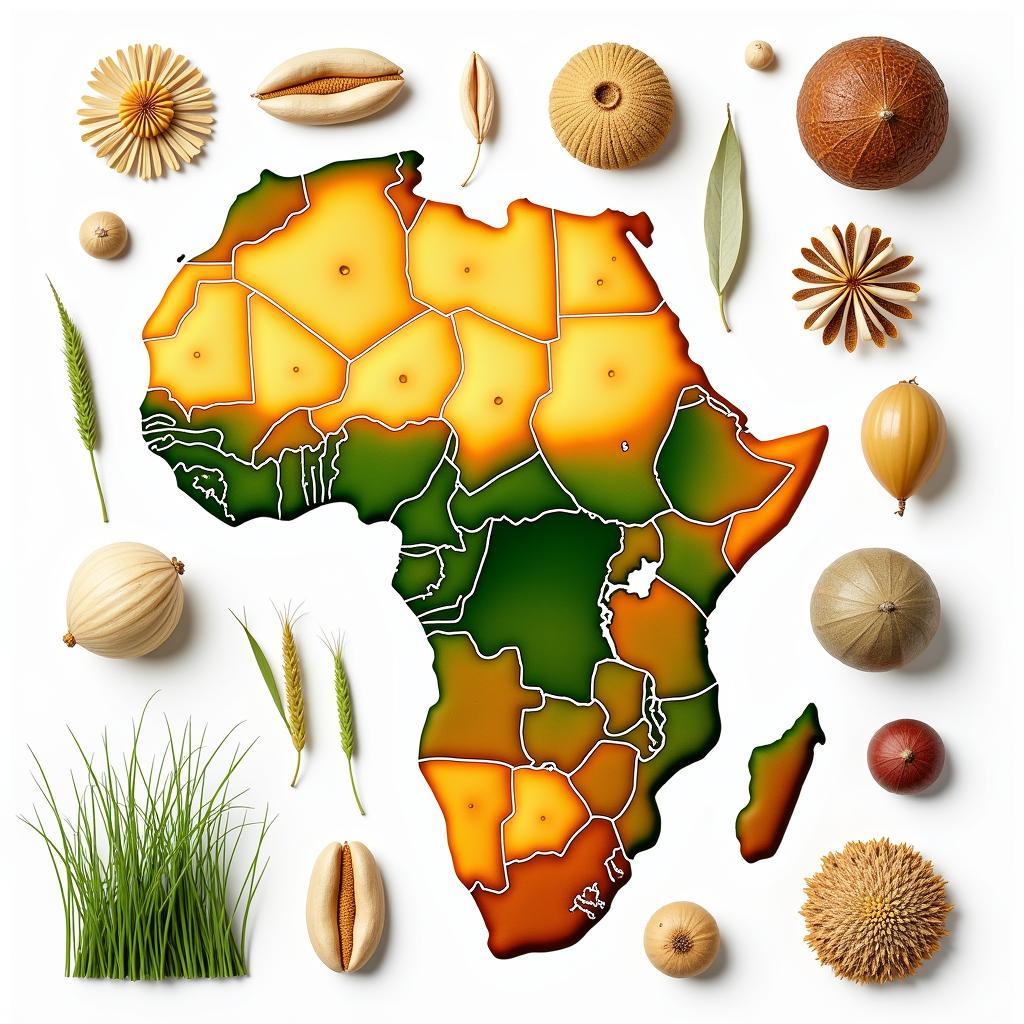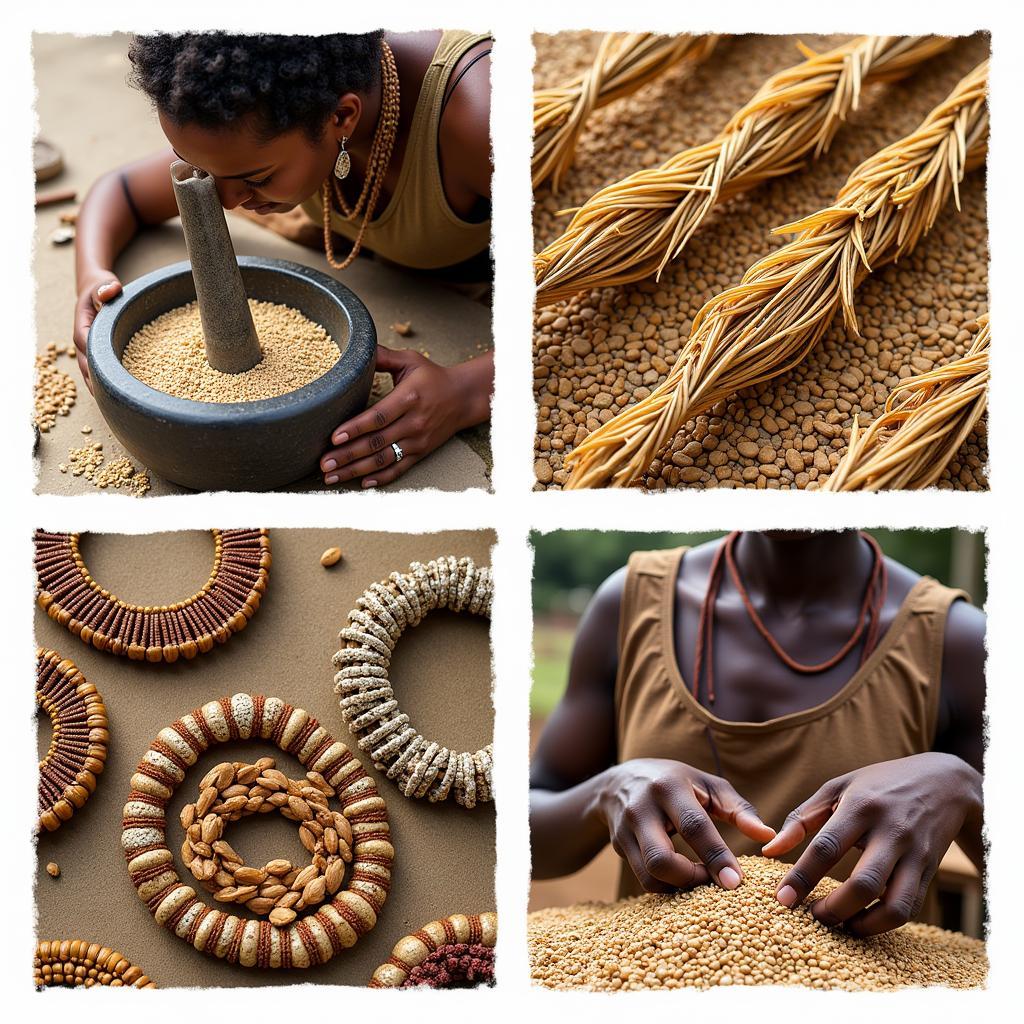Exploring the Wonders of African Grass Seed
African Grass Seed plays a vital role in the diverse ecosystems and cultures across the continent. From providing sustenance for wildlife to being used in traditional crafts and ceremonies, these seeds are an integral part of African life. This article explores the fascinating world of African grass seed, delving into its various types, uses, and significance.
The Diversity of African Grass Seed
Africa is home to a vast array of grass species, each producing unique seeds with distinct characteristics. These range from the tiny seeds of annual grasses, which germinate quickly after the rains, to the larger, more robust seeds of perennial grasses that can withstand harsh conditions. This diversity is a testament to the continent’s varied climates and landscapes, from the arid Sahara Desert to the lush Congo Basin rainforest. The seeds of these grasses are just as diverse, adapted to survive and thrive in their respective environments. For instance, some seeds have feathery attachments that allow them to be dispersed by the wind, while others rely on animals for dispersal. Understanding this diversity is crucial to appreciating the ecological and cultural importance of African grass seed.
After the first rains, the African savanna comes alive, and among the first plants to sprout are the various grasses, their seeds carried by the wind and scattered across the land. This burst of life is essential for the herbivores that graze on the tender shoots.
 African Grass Seed Diversity
African Grass Seed Diversity
Some grass seeds, like those of the teff grass, are incredibly small, yet they are packed with nutrients. Teff, native to the Ethiopian highlands, is a staple grain used to make injera, a spongy flatbread. This demonstrates the importance of even the smallest African grass seed in providing sustenance for local communities.
Traditional Uses of African Grass Seed
Beyond their ecological role, African grass seeds hold significant cultural value. Many communities have used these seeds for centuries in traditional crafts, ceremonies, and even as a source of food. For example, some tribes use certain grass seeds in traditional jewelry making, threading them together to create intricate necklaces and bracelets. Other communities use the seeds in divination practices, believing they hold spiritual significance.
The seeds of certain grass species are also ground into flour and used to make porridge or other traditional dishes. This resourceful use of African grass seed highlights its versatility and importance in sustaining livelihoods.
 Traditional Uses of African Grass Seed
Traditional Uses of African Grass Seed
For example, the African cockatiel bird, a popular pet worldwide, feeds on various seeds, including those of some grass species. Their beautiful plumage and playful nature make them cherished companions. Similarly, understanding the dynamics of African elephant vs rhino interaction is crucial for conservation efforts. These megaherbivores play vital roles in shaping the landscape and influencing the distribution of plant life, including grasses.
The Future of African Grass Seed
As the world faces increasing environmental challenges, the importance of sustainable agriculture and biodiversity conservation becomes ever more apparent. African grass seed, with its remarkable adaptability and diverse uses, offers potential solutions for both food security and ecosystem restoration. Research is ongoing to explore the potential of different grass species for improving soil health, combating desertification, and providing sustainable food sources for growing populations.
Protecting and utilizing the diversity of African grass seed is not only crucial for preserving the continent’s rich biodiversity but also for ensuring a sustainable future for generations to come. The African feather grass, with its ornamental plumes, is a prime example of how native grasses can be incorporated into landscaping and gardening, promoting both aesthetic beauty and ecological balance.
What are the common types of African grass seed?
There are numerous types of African grass seed, each adapted to specific regions and climates. Some common examples include teff, finger millet, and sorghum.
How is African grass seed used in agriculture?
African grass seed plays a vital role in agriculture, providing fodder for livestock and being cultivated for grains used in various food products.
What is the cultural significance of African grass seed?
African grass seed holds cultural significance in many communities, being used in traditional crafts, ceremonies, and as a symbol of prosperity and fertility.
 The Future of African Grass Seed
The Future of African Grass Seed
The African buffalo migration wikipedia offers a glimpse into the interconnectedness of the ecosystem. These migrations are driven by the availability of resources, including the grasses that provide sustenance. Similarly, learning more about African bull elephant facts can deepen our understanding of these magnificent creatures and their importance in maintaining the balance of nature.
Conclusion
African grass seed, far from being just a simple grain, represents a vital thread in the rich tapestry of African Life. From its ecological importance to its cultural significance, African grass seed offers a glimpse into the intricate relationship between humans and nature. Further exploration and research into the potential of these seeds hold promise for a sustainable future, both for the continent and the world. Understanding and appreciating the wonders of African grass seed is crucial for preserving the biodiversity and cultural heritage of Africa.
FAQ
-
What are some common uses of African grass seed?
African grass seed is used for food, fodder, crafts, and ceremonies. -
Where can I find more information about African grasses?
You can find more information online and in botanical gardens. -
Are there any conservation efforts related to African grasses?
Yes, various organizations are working to conserve African grasslands and their biodiversity. -
How can I contribute to the preservation of African grasslands?
Supporting conservation organizations and spreading awareness are ways to contribute. -
What are the challenges facing African grasslands?
Climate change, overgrazing, and habitat loss are some of the challenges. -
Can African grass seed be used in sustainable agriculture?
Yes, some species have potential for sustainable agriculture practices. -
How do different climates affect the types of grass seed found in Africa?
Different climates influence the adaptation and distribution of grass species and their seeds.
Gợi ý các câu hỏi khác, bài viết khác có trong web. You might also be interested in learning about the African feather grass.
Kêu gọi hành động: When you need help, please contact us at +255768904061, kaka.mag@gmail.com or visit us at Mbarali DC Mawindi, Kangaga, Tanzania. Our customer service team is available 24/7.